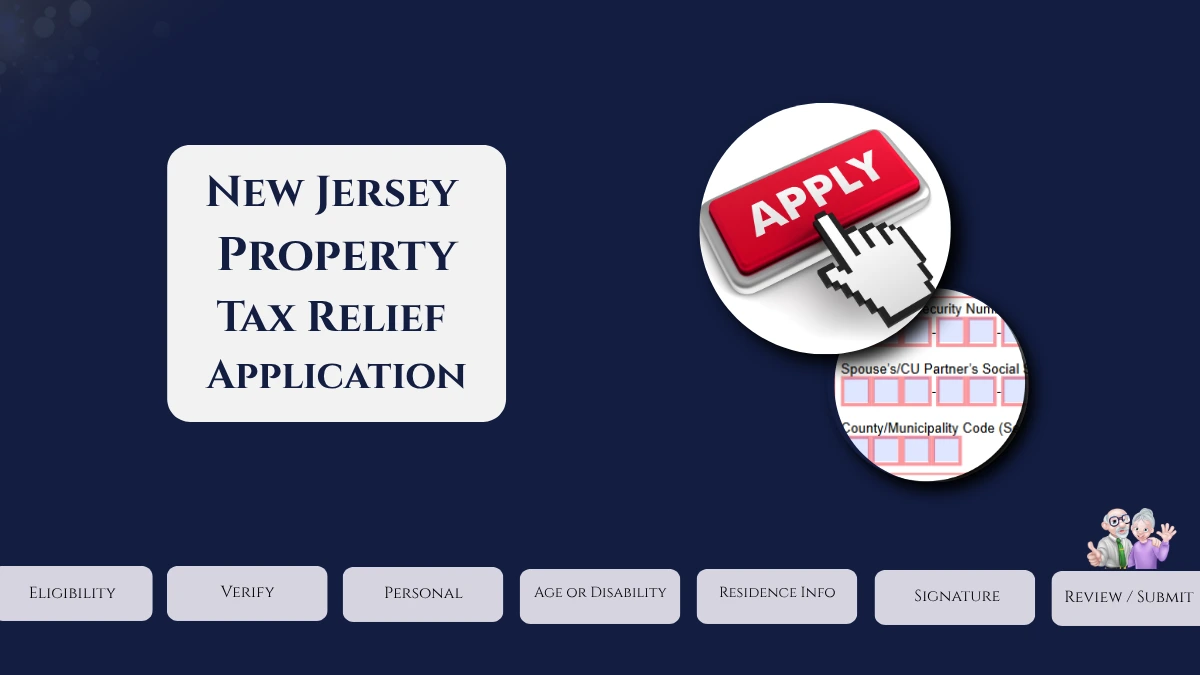The 2025 New Jersey Property Tax Relief Application (Form PAS-1) is now a unified process, allowing eligible residents to apply for the Senior Freeze, ANCHOR, and Stay NJ programs with a single form available both online and as a downloadable PDF.
This guide covers every step, addresses all scenarios, and ensures you to maximize your benefits to apply for property tax relief in New Jersey state.

What is New Jersey Property Tax Relief Application?
The New Jersey Property Tax Relief Application (Form PAS-1) is the official document for seniors (65+) and Social Security Disability recipients to apply for three major property tax relief programs:
- Property Tax Reimbursement (Senior Freeze)
- Affordable New Jersey Communities for Homeowners and Renters (ANCHOR)
- Stay NJ
This single application replaces older forms (PTR-1, PTR-2, ANCHOR-H, ANCHOR-T), streamlining the process for homeowners, mobile home owners, and renters.
Who is eligible to Apply New Jersey Property Tax Relief?
To qualify for property tax relief in 2025, you must meet these criteria:
- You or your spouse/civil union partner were 65 or older on December 31, 2024, or
- You or your spouse/civil union partner were receiving Social Security Disability benefits on December 31, 2023, and December 31, 2024.
- You owned or rented and lived in your main New Jersey residence for all of 2024, or at least on October 1, 2024.
- You meet specific income limits for each program:
- Senior Freeze: $163,050 or less (2023), $168,268 or less (2024).
- ANCHOR and Stay NJ: Income limits and eligibility subject to annual state budget updates.
New Jersey Property Tax Relief Application Process
Gather Required Information
- Social Security numbers (or ITINs) for both you and your spouse/partner.
- 2023 and 2024 New Jersey income details (tax returns, SSA-1099, etc.).
- Property details: address, block/lot numbers, county/municipality code (see PDF for codes).
- For mobile home owners: site fee records.
- If applicable, trust documents or proof of life estate.
Choose Your Filing Method and Proceed to Submit accordingly
- Online: Filing online provides a reference number, allows direct deposit, and lets you save progress.
- Paper: Download the New Jersey property tax relief application PDF free, print, and complete it to submit.
How to File New Jersey Property Tax Relief Application (PAS-1) Online
The New Jersey Property Tax Relief Application (PAS-1) online process is designed for seniors (65+) and Social Security Disability recipients, streamlining access to Senior Freeze, ANCHOR, and Stay NJ programs. Here’s a step-by-step guide based on the official online application interface and state guidance:
- Visit https://www.nj.gov/treasury/taxation/relief.shtml for the New Jersey property tax relief application online.
- Tap on File Online to open the page https://propertytaxreliefapp.nj.gov/
- Click File Property Tax Relief Application (PAS-1)
- Select Eligibility and Submit
- Begin by confirming your eligibility.
- The application is for homeowners and renters who are age 65 or older, or who were receiving Social Security Disability benefits on December 31, 2024.
- If you are under 65 and not receiving Social Security Disability, do not complete this application; you will be able to apply for ANCHOR separately in summer 2025.
- Complete Verification
- Provide Personal Information
- Complete Age and Disability Details
- Indicate your age as of December 31, 2024, and/or your Social Security Disability status.
- This step determines your eligibility for Senior Freeze, ANCHOR, and Stay NJ programs.
- Provide Residence Info
- Provide Signature Details
- Review All the Details and Submit
How to Fill and Submit the New Jersey Property Tax Relief Application (PAS-1)
You may fill all the details in the form online itself and download New jersey property tax relief application form pdf to print and send the same
- First open the PDF application online using nj.gov/treasury/taxation/pdf/24-pas1.pdf
- Enter Applicant and Spouse/Civil Union Partner Information
- Social Security Numbers
- Names (last, first, middle initial)
- Home Address (including apartment/rural route)
- City, State, ZIP Code
- County/Municipality Code (from Table on page 13)
- If different, enter main home address as of October 1, 2024
- Select Filing Status
- Mark the appropriate oval for your 2024 NJ-1040 filing status
- Complete Age and Disability Status
- Enter birth years for both applicant and spouse/partner
- Indicate if you or spouse/partner were receiving Social Security Disability benefits on December 31, 2023 and December 31, 2024
- Provide Residency Information
- Answer if you owned/rented and lived in the same principal residence in NJ for all of 2024
- If YES: Indicate status (Homeowner – Schedule I, Mobile Home Owner – Schedule II, Renter – Signature section)
- If NO: Answer if you owned/rented main home in NJ on October 1, 2024
- If YES: Indicate status (Homeowner – Schedule III, Mobile Home Owner or Renter – Signature section)
- If NO: STOP – Not eligible, do not file
- Answer if you owned/rented and lived in the same principal residence in NJ for all of 2024
- Complete Relevant Schedule
- Schedule I (Homeowners, all of 2024):
- Answer questions about property ownership, multi-units, co-op/retirement facility, property taxes, PILOT agreement, income for 2023 & 2024
- Schedule II (Mobile Home Owners, all of 2024):
- Answer questions about site occupancy, shared site fees, site fees (18% for 2023 & 2024), income for 2023 & 2024
- Schedule III (Certain Homeowners, owned/rented on October 1, 2024 only):
- Answer questions about property ownership, multi-units, co-op/retirement facility, block/lot, etc.
- Schedule I (Homeowners, all of 2024):
- Complete Income Worksheets
- Use Worksheet A/B/C/D as instructed to calculate and enter 2023 and 2024 New Jersey income
- Sign and Date the Application
- Applicant and spouse/partner (if filing jointly) must sign and date
- Paid preparer must sign and provide information if applicable
- Check box if submitting for deceased applicant and attach death certificate
- Mail Completed Application
- Send to:
NJ Division of Taxation
Revenue Processing Center
Property Tax Relief Application
PO Box 635
Trenton, NJ 08646-0635
- Send to:
- Submit by Deadline
- Application must be postmarked by October 31, 2025.
Note: Do not staple or clip the application. Attach all necessary documentation (e.g., trust agreements, death certificate) as instructed in the form.
Special Scenarios and Frequently Asked Questions
If You Share Ownership or Live in a Multi-Unit Home?
- Indicate your ownership percentage and the share used as your main home.
- You are not eligible if your property has more than four units or more than one commercial unit.
What we attach for Trusts and Life Estates?
- Attach the trust agreement and deed if applying for the first time as a beneficiary or life tenant.
What to share for Mobile Home Owners?
- Property taxes are calculated as 18% of annual site fees. Report your share if you split fees with non-spouse occupants.
Can Surviving spouses allowed to apply on behalf of deceased applicants?
- Surviving spouses or personal representatives can file if the applicant died after October 1, 2024, with proper documentation.
Where to Find the Application and Help
- Download the New Jersey property tax relief application PDF from the Division of Taxation website or request a copy by phone or the link provided as above.
- Assistance: Call the Property Tax Relief Hotline at 1-888-238-1233 or visit a regional information center.
Important Reminders
- Double-check income limits and eligibility each year, as they may change with the state budget.
- Keep a copy of your completed application for your records.
- For more details on property tax relief for seniors, see our in-depth guide on Property Tax Relief for Seniors in NJ
Conclusion:- The New Jersey Property Tax Relief Application streamlines access to vital programs for seniors and disabled residents. By following the steps above, you can confidently complete your New Jersey property tax relief application form online or by using the downloadable PDF, ensuring you receive all benefits you’re entitled to in 2025.
